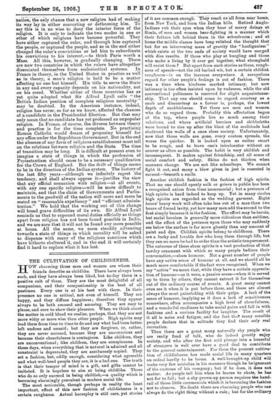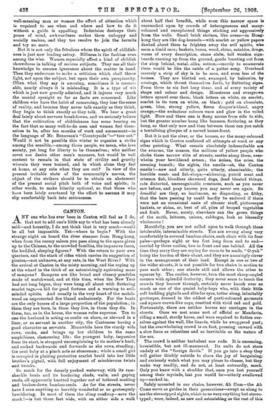THE CULTIVATION OF CHILDISHNESS.
W charming those men and women are whom their HO
friends describe as childlike. There have always been
such, and they have always been liked, but to-day there is a positive cult of them. They are the most delightful of all companions, and their companionship is the best of all pastimes. Every one is at his best with them. In their presence no one is critical, not even of himself. They are happy, and they diffuse happiness ; therefore they appear always to be both amused and amusing. They are easy to please, and sure to show their pleasure. When we think about the matter in cold blood we realise, perhaps, that they are not more witty or more wise than other people. High spirits may lead them from time to time to do and say what had been better left undone and unsaid; but they are forgiven, or, rather, they are never accused, because they are unconscious and because their cheerfulness is contagious. Like children, they are unconventional; like children, they are conspicuous. In these days, when everything that le natural is admired and all constraint is deprecated, they are assiduously copied. They set a fashion, but, oddly enough, considering what agreeable and what well-bred people they are, it is a bad one. The truth is that their temper of mind is a gift, and gifts cannot be imitated. It is hopeless to aim at being childlike. Those who do So only succeed in being childish, —a quality which is becoming alarmingly prevalent in modern social life.
The most noticeable, though perhaps in reality the least important, effect of this new fashion of childishness is a certain roughness. Actual horseplay is still rare, yet stories
of it are common enough. *They reach us allfrom near. home,.
from New York, and from the Indian hills. Retired Anglo- Indians rub their eyes when they hear of merry doings at Simla, of men and women bear-fighting in a manner which
their fathers left behind them in the schoolroom ; and at home the middle classes have long relished the thought that but for an intervening mass of gravity the " hooliganism" which exists at the two ends of society would have merged with dire results. If those who play at burgling and those. who make a living by it ever get together, what stronghold" will resist them ? But apart from such stories as these, rough- ness of speech—not the old barbed wit,.but a certain childish
roughness—is on the increase everywhere. A scrupulous regard for other people's feelings is out of fashion. There was a time when kindness marked intimacy, but now intimacy is too often insisted upon by rudeness, while the old conventional politeness is reserved for slight acquaintance- ship. That any one should come to regard courtesy as a snub and discourtesy as a favour is, perhaps, the lowest depth of snobbishness. Yet there are men and women who do so regard them. Probably this affectation began at the top, where people live so much among their relations, and where artificial barriers and shibboleths were bound to rise up after the blast of the multitude had shattered the walls of a once close society. Unfortunately, now that those walls are gone, every custom spreads, the worse the quicker. It is looked upon as rather smart
to be rough, and to leave one's interlocutor without an answer as often as possible. The habit is very childish and inconsequent. It makes against friendship, and all sense of
social comfort and safety. Skins do not thicken when manners change. We are not like schoolboys. We cannot fight it out, and many a blow given in jest is resented in earnest—beneath a smile.
Another childish fashion is the fashion of high spirits. That no one should openly sulk or grieve in public has been a recognised axiom from time immemorial ; but a pretence of
high spirits is hard indeed to keep up. Yet in many circles high spirits are regarded as the wedding garment. Eight hours' heavy work will often take less out of a man than two hours of forced levity, yet how many men add the second to the first simply because it is the fashion. The effort may be heroic, but social heroism is generally more ridiculous than sublime, and the effect of the pretence upon those who may suddenly see below the surface is far more ghastly than any amount of paint and dye. Childish spirits belong to childhooa. There are a lucky and lovable few who keep them through life, but they can no more be had to order than the artistic temperament. The outcome of these sham spirits is a vast production of that tawdry ornament with which so many people bedizen their conversation,—sham humour. Not a great number of people have any active sense of humour at all, and we should all be much more comfortable if the fact were recognised. When we say "active" we mean that, while they have a certain apprecia- tion of humour—as it were, a passive sense—when it is served. up to them by others, they cannot extract it for themselves out of the ordinary course of events. A great many cannot even see it when it is put before them, and these are almost always the most painstaking with their quips. A lack of the sense of humour, implying as it does a lack of sensitiveness somewhere, often accompanies a high level of cheerfulness, and a wonderful readiness to take social pains and fall in with fashions and a curious facility for laughter. The result of it all is noise and fatigue, and the fact that many sensible people declare that in solitude they find their only real recreation.
Then there are a great many naturally shy people who are really fond of talk, who do indeed greatly enjoy society, and who after the first cold plunge into a houseful of strangers is well over have a good deal to contribute to the general entertainment. For them the present cultiva-
tion of childishness has made social life in many quarters an ordeal hardly to be borne. A well-brought-up child will make very few mistakes in his manners though he be ignorant of the customs of his company; but if he does, it does not matter. As people tell him when be learns to skate, he has not far to fall ; but a shy grown-up person requires the hand- rail of those little ceremonials which it is becoming the fashion not to observe. No doubt there are charming people who can always do the right thing without a rule ; but for the ordinary
well-meaning man or woman the effort of attention which is required to see when and where and how to do it without a guide is appalling. Indecision destroys their peace of mind, awkwardness makes them unhappy and socially useless, and they too resolve to join the hermits and try no more.
But it is not only the frivolous whom the spirit of childish- ness is just now leading astray. Silliness is the fashion even among the wise. Women especially affeot a kind of childish shrewdness in talking of serious subjects. They use all their knowledge to assume ignorance about the matter in hand. Than they endeavour to make a criticism which shall throw light, not upon the subject, but upon their own perspicacity. Often what they say is amusing, sometimes it is memor- able, nearly always it is misleading. It is a type of wit which is just now greatly admired, and it injures very much the mental eyesight so far as facts are concerned. Like children who have the habit of romancing, they lose the sense of reality, and because they never talk exactly as they think, they begin to think exactly as they talk. We hear a great deal lately about nervous breakdowns, and we seriously believe that the cultivation of childishness has some bearing on the fact that so many well-to-do men and women feel them- selves to be, after ten months of work and amusement—in the language of Mr. Bensusan's " Countryside "—" tore out." Would it not be possible this winter to organise a strike among the sensible among those people, we mean, who love society, yet long for liberty to be themselves; who neither covet nor desire other men's manners, but would be well content to remain in that state of civility and gravity wherein they were trained, and in which alone they feel at home, at any rate when they are out P In view of the present irritable state of the community's nerves, the object of the strikers should be to obtain an abatement of the present social pitch both of voice and spirits; in other words, to make hilarity optional, so that those who have been lately overtaxed by the effort to assume it may slip comfortably back into seriousness.











































 Previous page
Previous page